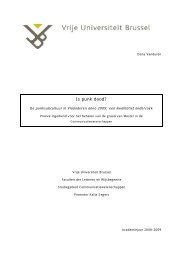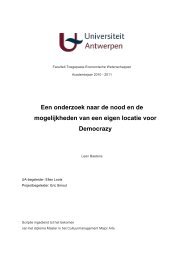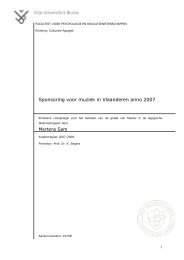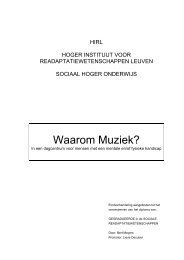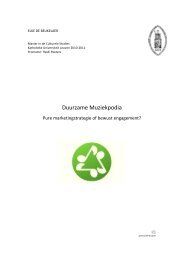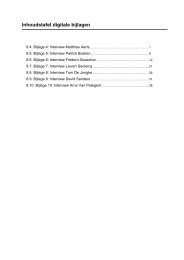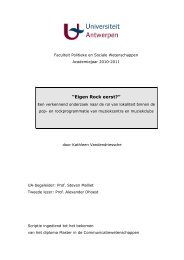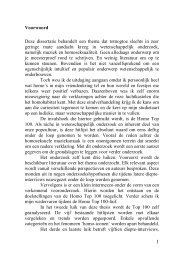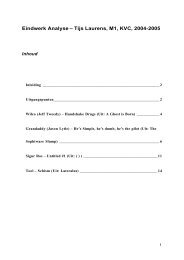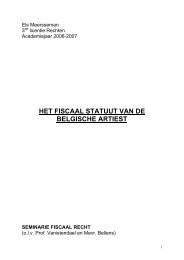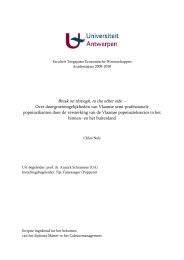Hip hop identity in a township reality. - Poppunt
Hip hop identity in a township reality. - Poppunt
Hip hop identity in a township reality. - Poppunt
Create successful ePaper yourself
Turn your PDF publications into a flip-book with our unique Google optimized e-Paper software.
Code-switch<strong>in</strong>g seemed to be a valuable way to construct this <strong>identity</strong> by the way<br />
you speak. Most of our <strong>in</strong>formants make use of the American hip <strong>hop</strong> slang to<br />
def<strong>in</strong>e their ‘real’ hip <strong>hop</strong> <strong>identity</strong> and membership. They are cross<strong>in</strong>g a figurative<br />
boundary which is not a legitimate action s<strong>in</strong>ce they don’t actually ‘belong’ to this<br />
group of American hip <strong>hop</strong>pers. We have to note two th<strong>in</strong>gs here. First of all, not all<br />
people have equal access to the resources necessary to build a particular <strong>identity</strong>,<br />
because these resources and capacities are unequally distributed. Thus, not all<br />
people will be able to perform a certa<strong>in</strong> <strong>identity</strong>, due to the restricted capacities to<br />
do so (Blommaert, 2005: 207). Secondly, some capacities may be successful <strong>in</strong><br />
certa<strong>in</strong> environments, but may have the opposite effect <strong>in</strong> other circumstances<br />
(Blommaert, 2005: 206). A Gambian person speak<strong>in</strong>g English <strong>in</strong> The Gambia, will<br />
probably be associated with societal success, while his variety of English would very<br />
likely be categorised as ‘bad’ English by a lot of British, and he or she would be<br />
associated with the lower ranks of society. This also applies to our <strong>in</strong>terviewees’ use<br />
of American hip <strong>hop</strong> slang, which is part of a specific variety of ‘black’ English,<br />
centralised around certa<strong>in</strong> topics. They may drop just enough slang words to show<br />
alignment with this particular group, but if they were to actually be <strong>in</strong> the Bronx, it<br />
would become immediately clear that they come from a different place.<br />
When one does not pay attention to all of these seem<strong>in</strong>gly small and trivial switches<br />
<strong>in</strong> code, a great deal of important <strong>identity</strong> markers passes one by completely<br />
(Blommaert, 2005: 209). Because we researched on all of the different elements that<br />
are used to construct <strong>identity</strong>, we are able now to have a more complete and<br />
profound picture. This is <strong>in</strong> contradiction to people who see this from a greater<br />
distance, which blurs their view. The <strong>identity</strong> categories become more general and<br />
less precise the greater the distance is. To substantiate this, all African people may<br />
look the same to an average European but it is unlikely he or she would not be able<br />
to dist<strong>in</strong>guish the Italian amongst a group of Swedish people. He or she would be<br />
able to categorise people com<strong>in</strong>g from all parts of the relatively small cont<strong>in</strong>ent of<br />
Europe, while he or she would probably fail on this task with one such as Africa.<br />
This example might be just <strong>in</strong> the sphere of appearance, it can also be applied to<br />
stereotypes <strong>in</strong> general. For people who do not know much about rap music, this<br />
music genre seems to be constra<strong>in</strong>ed to gangsta rap only, while it might be clear,<br />
after read<strong>in</strong>g this thesis, that rap music consists of more than this particular<br />
subgenre.



